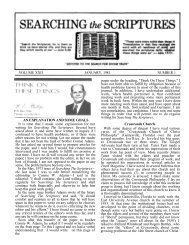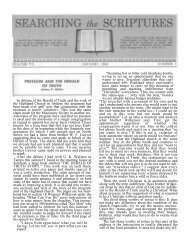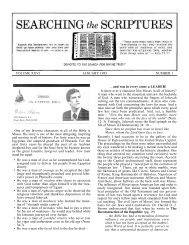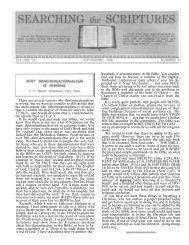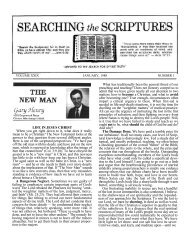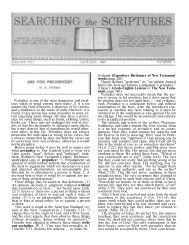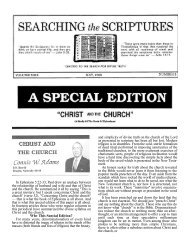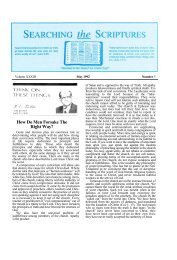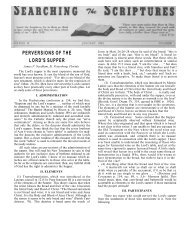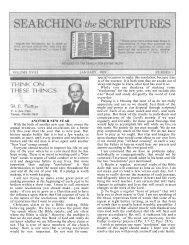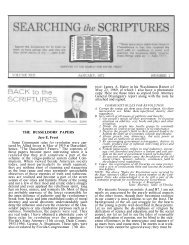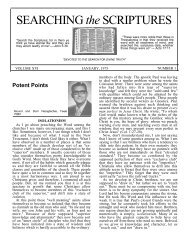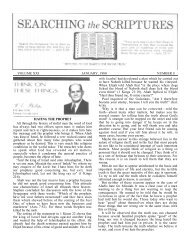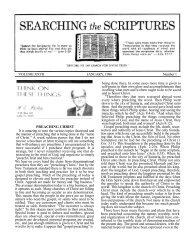Volume 31 – 1990 (PDF) - Searching The Scriptures
Volume 31 – 1990 (PDF) - Searching The Scriptures
Volume 31 – 1990 (PDF) - Searching The Scriptures
Create successful ePaper yourself
Turn your PDF publications into a flip-book with our unique Google optimized e-Paper software.
Page 10<br />
a chain that is broken apart by the breaking of one link<br />
or a circle marred by one piece out of place. If any part of<br />
a man be leprous, the whole man is judged a leper. If I<br />
stub my toe, not only does the toe hurt, but the whole<br />
body is affected. As Paul said, "And whether one member<br />
suffer, all the members suffer with it" (1 Cor. 12: 26).<br />
James' statement, "For whosoever shall keep the<br />
whole law, " is a theoretical statement because no one<br />
keeps the whole law and offends in only one point. He<br />
had previously said, "For in many things we offend all"<br />
(Jas. 3: 2). But, IF a man could be perfect, except in one<br />
thing, he would still be a transgressor, a law-breaker,<br />
and, therefore, guilty of the law as a whole.<br />
<strong>The</strong> context of Jas. 2: 10 is dealing with partiality to<br />
the rich. Some of those to whom James wrote might have<br />
reasoned, "Why make so much of this matter of respect<br />
of persons? It is only a single offense and it is surely not<br />
to be taken too seriously?" But James said, though you<br />
keep all the law of God, except impartiality toward<br />
persons, ye sin and are guilty of all.<br />
Some of us may look at serving God as accumulating<br />
merit points for good conduct. "Lord, look at how well I<br />
have followed thy precepts and how faithful I have been<br />
to thy law. Surely, all this will overshadow my one sin<br />
and make it an insignificant matter. " "No, " God<br />
says, "you are a transgressor!"<br />
"BY ALL MEANS SAVE SOME"<br />
A BELATED RESPONSE TO THE EDITOR OF<br />
THE GOSPEL ADVOCATE<br />
Furman Kearley, editor of the Gospel Advocate,<br />
editorialized that the church may support camps, colleges,<br />
day care centers, build gymnasiums, swimming<br />
pools, etc. because Paul said "By all means save some"<br />
(G. A., Nov., 1988). <strong>The</strong> article appeared just before the<br />
Nashville Meeting. I have thought about it considerably<br />
before responding.<br />
Was Paul using "all" in an unlimited sense (as some<br />
brethren misused "all men" in 2 Cor. 9: 13 and some<br />
Pentecostals misuse "all flesh" in Acts 2: 17)? Did<br />
Paul mean to include any and every method of gaining<br />
converts? This was the position taken in the editorial.<br />
Or, did Paul mean all means that are lawful? <strong>The</strong>re<br />
is a vast difference in saying "anything goes" in<br />
evangelism and in saying we may use all means that are<br />
authorized. We are not authorized to make converts by<br />
means of:<br />
(1) THE SWORD. People have often joined a move-<br />
ment because they were physically coerced. History<br />
shows that during the Crusades and during the Dark<br />
Ages many "joined the church" because of the threat of<br />
violence. Some have joined other world religions and<br />
even communism for the same reason. When Paul in-<br />
toned that he might "by all means save some, " the all did<br />
not mean without limitations. It was limited to all<br />
means authorized by the word of God.<br />
(2) BOYCOTT. Without using physical violence one<br />
may be persuaded to see things our way if we organize,<br />
plot and boycott this product. This method has been used<br />
by pro-pornography and women's lib forces. It is also<br />
used by anti-pornography and pro-life forces. People<br />
have a right to shop where they want. But we have no<br />
right to send the message that if you are not converted<br />
we will, through boycott and political maneuvers, make<br />
you wish you had. This is a means not available to us.<br />
(3) THE MISSIONARY SOCIETY. <strong>The</strong> society was<br />
formed in 1849. It was an unauthorized man-made<br />
institution, separate and apart from the church. It was<br />
designed to do evangelistic work. Consider this state-<br />
ment:<br />
<strong>The</strong> first charge that was hurled against the Society<br />
which was that it was a substitute for the church.<br />
<strong>The</strong> Society had no divine authority for its existence;<br />
it owed its inception to human wisdom and human<br />
opinions. Whereas God left the evangelizing of the<br />
world to local churches..., the Missionary Society<br />
was, in effect, a substitute for God's plan. It implied an<br />
imperfection in the divine plan and suggested that<br />
human wisdom could improve upon divine. <strong>The</strong>refore,<br />
as some men, particularly David Lipscomb,<br />
looked at the Society, man could only defend the<br />
Society by first defending his right to substitute<br />
human plans for the divine. This, in summary, was<br />
the most serious charge hurled its way (Earl West,<br />
SEARCH FOR THE ANCIENT ORDER, Vol. II, p.<br />
57).<br />
Because of Missionary Society a major division took<br />
place that led to the formation of the Christian Church<br />
which, itself, has divided into two separate bodies.<br />
Brother Kearley tries to make Paul say "the end<br />
justifies the means. " Paul said "God forbid!" He had been<br />
falsely accused of teaching that we may do evil that good<br />
may come (Rom. 3: 8). Any unauthorized practice is<br />
"evil. " <strong>The</strong> editor said, "if the church is... spending<br />
money with the clear goal of saving souls then it is<br />
justified. " Those who invented the Society wanted to<br />
save souls, brother Kearley.<br />
<strong>The</strong> Advocate has a long history of editors who stood<br />
solidly against the Society as an unscriptural organization<br />
(beginning with David Lipscomb).<br />
(4) WOMEN PREACHERS. <strong>The</strong>re is a good deal of<br />
teaching a woman may do (Acts 18: 26; Tit. 2: 3-5).<br />
Some women in the church taught over the men at the<br />
recent "Nashville Jubilee. " <strong>The</strong>re are women who would<br />
like to be preachers. <strong>The</strong> Advocate editor believes the<br />
need is more important than the means. Elaborating,<br />
he said "What is legitimate church work is not<br />
determined by an artificial list of items but rather is<br />
determined by the



